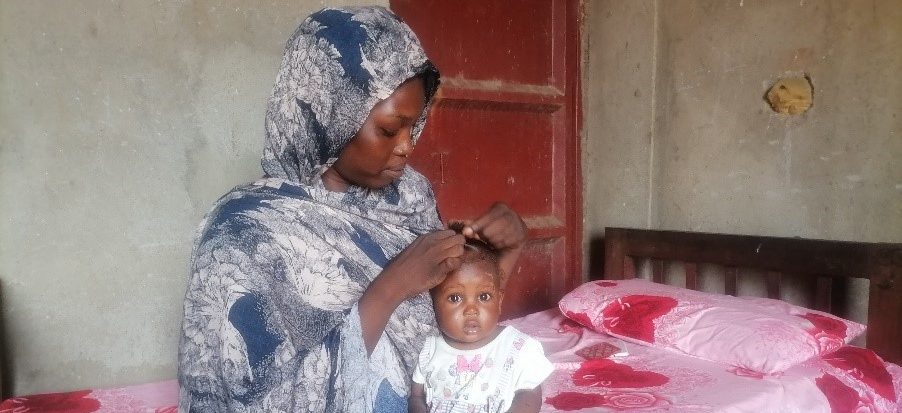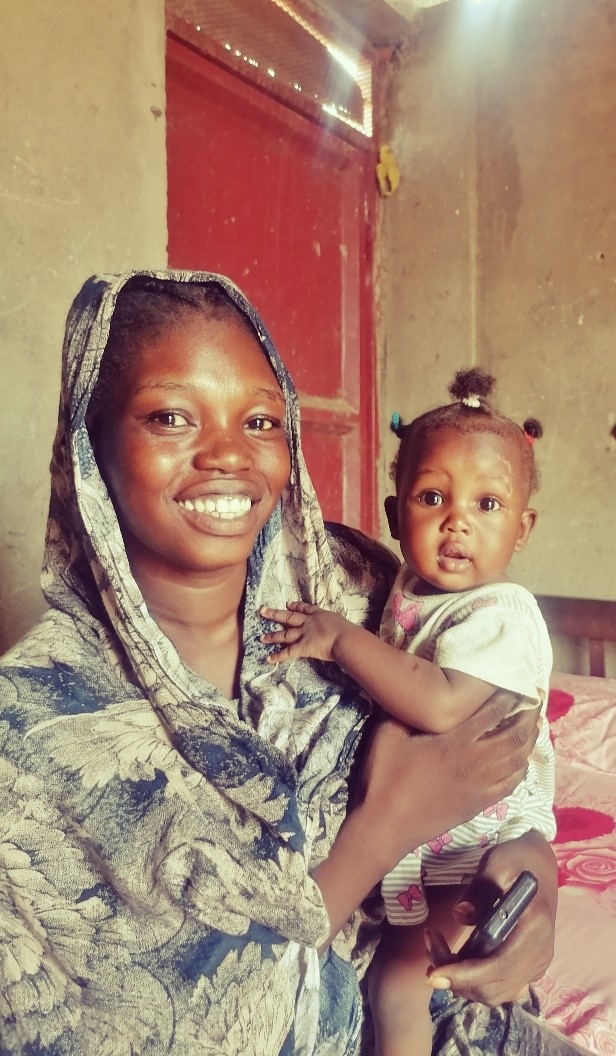Nutrition Screening, Counseling, and Treatment of Infants and Mothers In South Sudan Results in Improved Health and Community Advocates
Published on October 9, 2023

By Angelina Boi Nasira, MAMI Coordinator, MOMENTUM Integrated Health Resilience, South Sudan
Nineteen-year-old Bernadetta Joseph and her husband Yohannes, a teacher, live in the community of Kabo in Juba County, South Sudan. Bernadetta became a first-time mother with the birth of her daughter, Lemis, in January 2023, but her experience in taking care of an infant was limited. When Lemis became sick and was having trouble breastfeeding, Bernadetta was filled with uncertainty and anxiety. She tried everything she could think of, even buying medicine at the nearest pharmacy, but nothing worked. It was then that she decided to seek help.
Bernadetta took Lemis to the Gurei Primary Health Care Center, where MOMENTUM Integrated Health Resilience is partnering with the Government of South Sudan to adapt and test the Management of Small and Nutritionally At-Risk Infants under Six Months and Their Mothers (MAMI) Care Pathway. This suite of resources facilitates “the screening, assessment, and management of small and nutritionally at-risk infants under six months and their mothers,”1 with the goal of improving their nutrition and overall health. Being able to manage at-risk infants early on also helps health workers reduce the chance of adverse outcomes for their patients—decreasing their vulnerability to infections and preventing conditions such as stunting and wasting. Ultimately, this lessens the harm and burden of undernutrition individually and nationally.
In November 2022, the Integrated Food Security Phase Classification predicted that “about two-thirds of the South Sudanese population (7.76 million people) [would] face acute food insecurity during the April-July 2023 lean season while 1.4 million children [would] be malnourished.”2 Through the use of the MAMI approach, MOMENTUM seeks to mitigate these life-threatening circumstances and align with USAID’s mission “to equip people with the skills, tools, and resources to improve their families’ health, diets, and nutrition, especially early in life when it matters most.”3
At Gurei, Bernadetta met the dedicated MAMI team. Lemis was then screened and found to weigh 3 kilograms (around 6.5 pounds) at 1 month, with a mid-upper arm circumference (MUAC) measurement of 110 millimeters (4.3 inches). Based on these findings, the team identified the baby girl as being in the moderate health and nutrition risk category, and both mother and daughter were enrolled for counseling and follow-up care and treatment.

From that moment on, Bernadetta and Lemis became regular visitors to the health facility. Over the course of several visits, they received continuous care and support from the MAMI team. During counseling, Bernadetta learned about breastfeeding techniques and the importance of family support. In addition, the facility administered medications to Lemis to address her medical issues.
And their efforts paid off. After six months, Bernadetta and Lemis were discharged as the baby had reached a healthy weight of 6.2 kilograms (around 13.5 pounds) and a MUAC measurement of 130 millimeters (5.1 inches). In fact, Bernadetta was so moved by the life-changing impact of the MAMI program that she decided to become an advocate for MAMI in her community.
During Sunduk, a biweekly gathering in which local women discuss health and economic issues, Bernadetta shared her experience with MAMI and spread the word about the program’s benefits. As a result, two more mothers with infants sought help at the health facility and enrolled in the MAMI program. As Bernadetta explained, “The MAMI program not only transformed my life, but also empowered me to make a positive impact in my community.”
MOMENTUM’s work in South Sudan represents an important step in more fully adapting the MAMI Care Pathway in fragile settings and documenting the process through research that is not often carried out when the approach is implemented. The project’s pilot study will enroll 500 at-risk infants and their mothers at five sites in four South Sudanese states, and they will remain in the program until the infants reach 6 months. Through this study, MOMENTUM will explore the feasibility and acceptability of using the MAMI Care Pathway through the existing primary health care system of admission, treatment, follow-up, and referral.
For her part, Bernadetta firmly believes in the power of MAMI to change mothers’ perceptions and practices relating to infant care. As she celebrated Lemis’ 6-month birthday, Bernadetta couldn’t help but feel hopeful for the future. She also plans to continue spreading the message to other women in her community, encouraging them to prioritize exclusive breastfeeding and introduce complementary foods gradually at the appropriate time.
Bernadetta’s determination, coupled with the support and guidance she received from the MAMI program, allowed her to overcome challenges and pursue her dreams. As she gazed lovingly at her daughter Lemis, Bernadetta said, “The support I received from the MAMI program at Gurei turned my story into a success.”
References
- Grey, K., Brennan, E., et al. 2021. The South Sudan Medical Journal. “The MAMI Care Pathway Package: A resource to support the management of small and nutritionally at-risk infants under six months of age and their mothers (MAMI).”
- UNICEF. 2022. “Hunger and malnutrition being driven by climate crisis and conflict in South Sudan.” https://www.unicef.org/press-releases/hunger-and-malnutrition-being-driven-climate-crisis-and-conflict-south-sudan.
- USAID. “Nutrition.” https://www.usaid.gov/nutrition.

